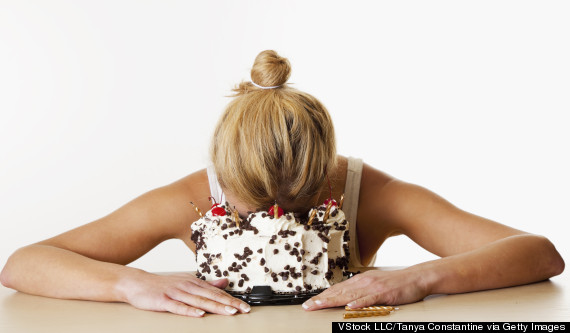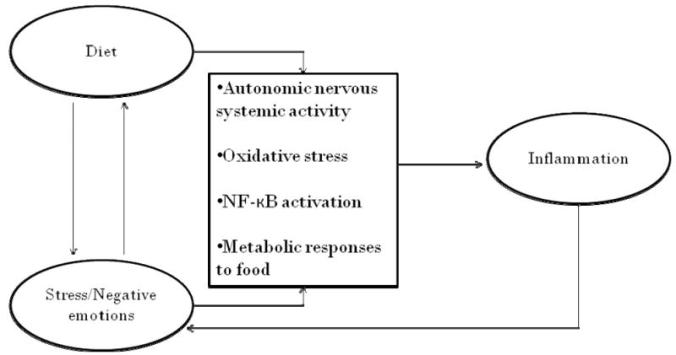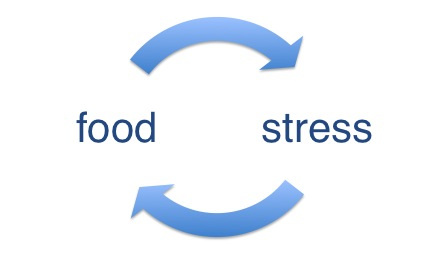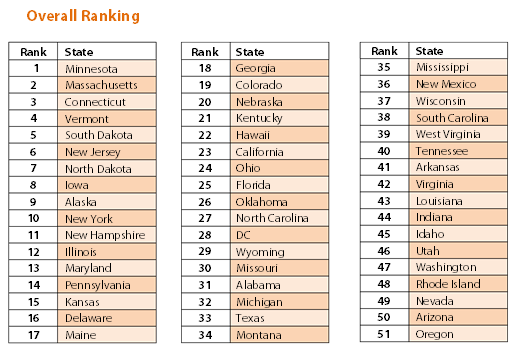Well, what do you think? Does eating unhealthy foods make you feel “stressed” or does stress make you eat unhealthy? Research supports that both assertions are true. I think many of us can relate to both statements and often, they perpetuate one another.

We have all had the bad day when we venture out to the grocery store and find ourselves justifying the pint of Ben & Jerry’s or perhaps more if it was a really bad day. We sit at home watching something usually not worthwhile on TV… the sugary goodness of our pleasures seems to distract us from the stress for a short while until we realize one serving size has turned into four and starting at the nutrition label, realize the gravity of our actions, feel gluttonous, guilty, and when we look in the mirror before bed, swear our love handles became even easier to grab…which in turn, is a bit stressful. In most cases we do not wake up feeling rejuvenated by our choices the next morning either.
One of my favorite introductory articles authored by Janice Kiecolt-Glaser (2010) discusses the bidirectional relationships between food choices and stress and how they ultimately contribute to inflammatory processes throughout your body. 

Your emotional wellness and your gut are intimately connected. This is why nutrition is critical to restoring mental health and vitality. The brain and gut talk to each other all the time. You may have heard before that your gut is akin to your “second brain” and it truly is! Many of us can likely relate to gastrointestinal distress or discomfort during times of high stress or anxiety. The vagus nerve, which innervates both the brain and gut continuously sends signals back and forth facilitating the constant communication.

Stress can impact food choice and cause negative metabolic responses to food intake. Certain foods can be either pro inflammatory or anti inflammatory, which can either reduce or add to the perception of stress. When this cycle of unhealthy food intake and stress is perpetuated, chronic inflammation can often ensue.
Inflammation is a bit of an abstract concept and while it may seem all negative, inflammation is the process by which we also heal from injury and fight illness. The mechanisms by which inflammation can become chronic vary, but may certainly be caused or influenced by both chronic stress and pro inflammatory foods.
Increases in the body’s inflammatory markers, such as interleukin-6 (IL-6), C-reactive protein (CRP), nuclear factor kappa B, and other pro inflammatory cytokines all have been associated with diets high in starches, processed foods, and trans-fats, which basically sums up our Standard American Diet. Furthermore, these foods increase oxidative stress on the body and the build up of free radicals, which can be harmful in excess. Oxidative stress in turn, promotes nuclear factor kappa B, which promotes genetic expression of pro inflammatory cytokines.
Did I just overwhelm you with scientific verbiage? It’s okay, in a nutshell just know that when you eat the Standard American Diet (aka crappy food) day after day, your body is likely to become inflamed and you are unlikely to feel all that balanced emotionally either.
Chronic stress and depression have been associated with delayed wound healing and infectious disease, which also support the connection to pro inflammatory processes.
Soooo…now that we know stress, food choices, and inflammation are all interconnected, what is the best approach to actually feeling better? Since stressors may or may not be avoidable, I favor a food first approach when working with clients. Here are some general rules:
- Minimize refined carbohydrates and excess sugars as much as possible. I am not a fan of grains in general, but if you do consume grains, make sure they are whole grains and non-GMO/organic if at all possible.
- Push the Omega-3 and watch the Omega-6. Omega-3 (found in fish, walnuts, flax seeds, etc) and notably, eicosapentaenoic acid (EPA) and docosahexanoic acid (DHA) have significant anti-inflammatory properties when Omega-6 or arachidonic acid (AA) conversely increases inflammation (found in vegetable, safflower, sunflower, and corn oils). It is ideal that the ratio of Omega 6:3 is around 4:1. Just for a comparison, the typical Standard American diet is much more lopsided at around 12-25:1.
- Do NOT be afraid of healthy fats. Avocados, nuts, seeds, olive oil, salmon, whole eggs, coconut oil. Compared to all macronutrients, fats are the most sustainable energy source we can consume. Your brain in particular thrives on fat. You may have heard about the ketogenic diet, which promotes a high fat/low carb diet. This has been shown to be particularly helpful for neurological/cognitive function.
- Fall in love with plants…particularly vegetables. Try to buy these organic when possible. Eat as many as you want. Enjoy a colorful variety, which will supply the body with powerful antioxidants.
- Be weary of dairy. Dairy and cow’s milk in particular includes a protein, casein, which has been linked to depression, anger, and even addiction. There may actually be a reason it is hard to give up cheese!
- If a food label has ingredients you cannot pronounce or you have no idea what it is, that is generally a clue to avoid it.
- Don’t get too stressed about being perfect! People who obsess about their food choices are not solving the problem as it often causes stress, guilt, and unnecessary negative self-talk. Enjoy food and give yourself grace!
Certainly when possible we need to also be vigilant about the stressors in our lives. Are they modifiable? Can we implement strategies to reduce stress so we are not so tempted by the Ben & Jerry’s, potato chips, bottle of wine, etc?
As with all things, the first step is awareness and the recognition that restoring emotional wellness involves much more than medication alone. Stay tuned for more about how food can restore your vitality!






